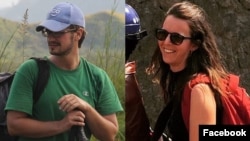The United States on Monday called for the United Nations to investigate who murdered two U.N. sanctions monitors in Democratic Republic of Congo (DRC) amid mounting criticism of the Congolese authorities' own inquiry.
American Michael Sharp and Swede Zaida Catalan disappeared in March in central Congo's Kasai region, where hundreds have died since last July in an insurrection against the government.
Their bodies were found two weeks later in a shallow grave.
They were part of an independent panel of experts investigating sanctions violations, who report to the United Nations Security Council.
U.N. Secretary-General Antonio Guterres set up an internal board of inquiry into what happened, which is due to report by the end of July, but U.S. Ambassador Nikki Haley called for him to establish a special investigation that would lay blame.
"Their families deserve justice. We owe it to their legacy to end the human rights abuses being carried out by armed groups and the DRC government against the Congolese people," Haley said in a statement.
Sweden has opened a police investigation and U.N. diplomats said U.S. authorities had also been looking into the case.
Congo's foreign minister, Leonard She Okitundu, last month opposed the creation of an international inquiry.
Congolese military prosecutors announced last month that two suspected militiamen would soon face trial for the killings, but rights groups say they suspect Congolese forces could have been involved in the deaths.
A U.N. spokesman last month cast doubt on the credibility of the Congolese investigation, saying the world body was "taken aback at the rapidity at which it was done."
Haley said the United States would also support the Geneva-based Human Rights Council establishing a Commission of Inquiry into the ongoing human rights violation in the Kasai region, where Sharp and Catalan went missing.
The remote, heavily forested region in central Congo has been riven by clashes between security forces and a local tribal militia called the Kamuina Nsapu since July.
At least 400 people have been killed and 200,000 displaced since fighting broke out when police killed the militia's leader last August, the U.N. has said. The top U.N. rights official said in March that three mass graves had been discovered.
Insecurity in Congo, where millions died in civil wars around the turn of the century, has worsened since December when President Joseph Kabila refused to step down at the end of his constitutional mandate.





